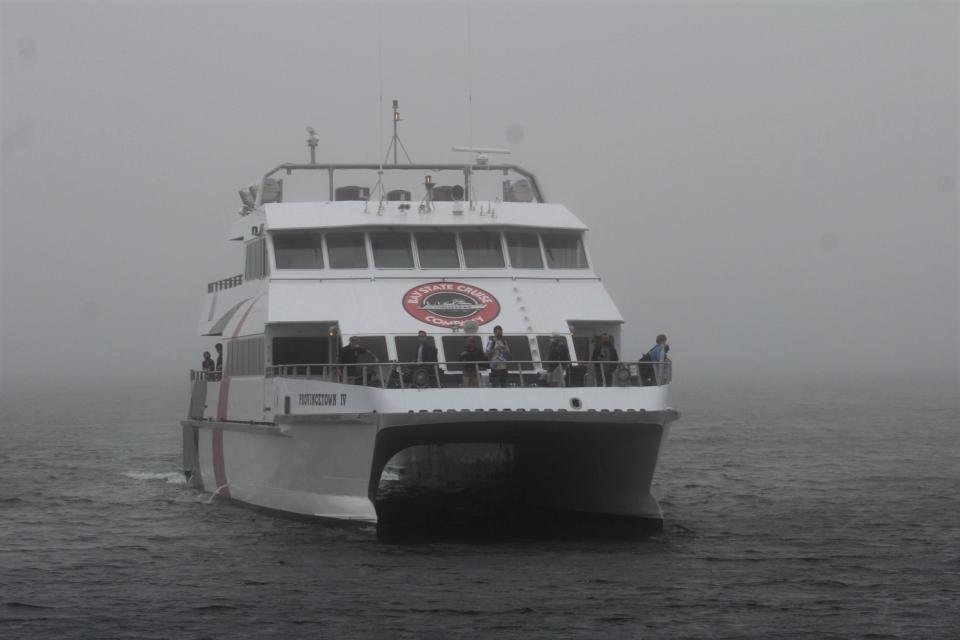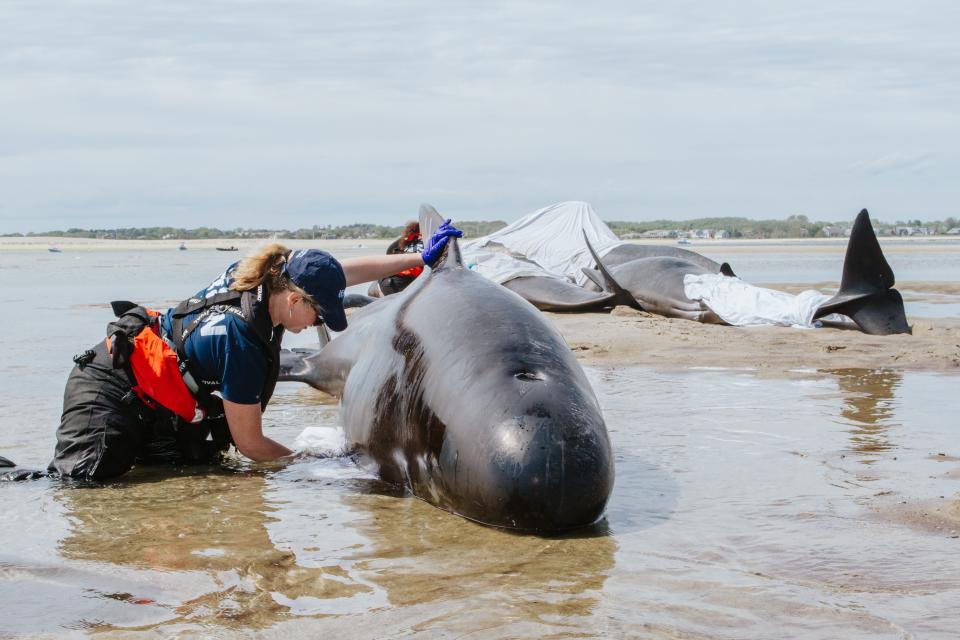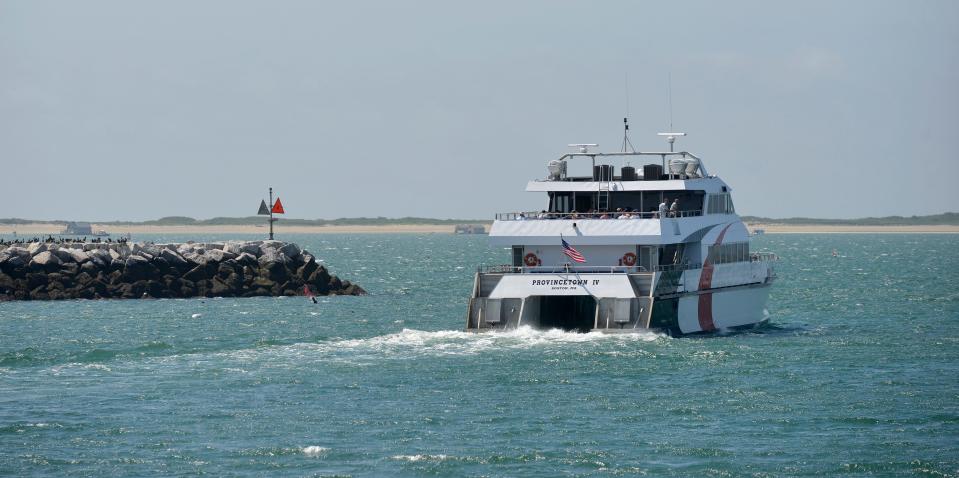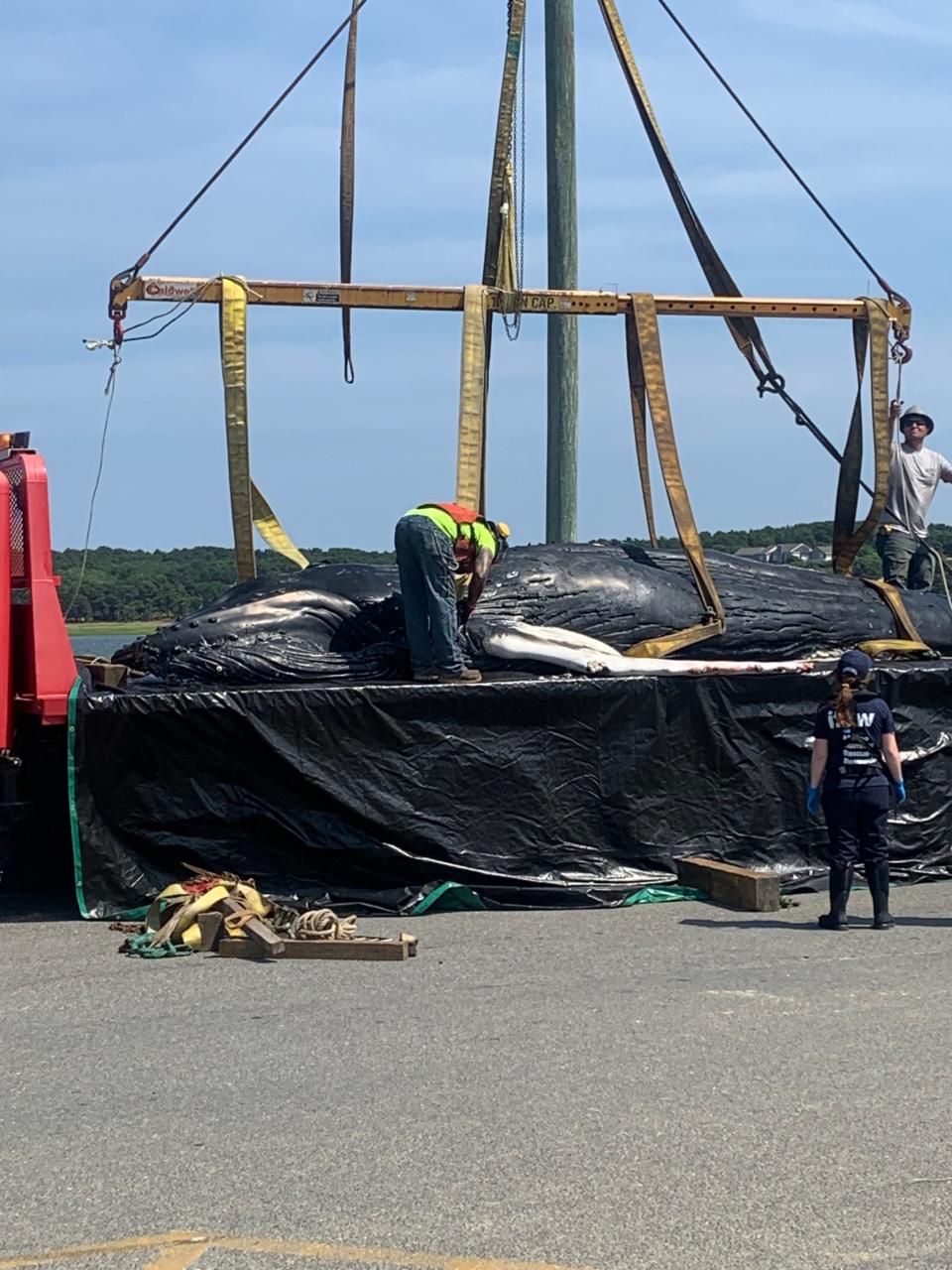Taking it slow for whales. NOAA eyes more restrictions to protect right whales, but it could be costly for PTown, ferries
Among the diverse marine animals that traverse Massachusetts and Cape Cod bays, arguably the most beloved are the many species of whales that come to feed here, from humpbacks to finbacks, minke and pilot whales.
There are also the North Atlantic right whales. For them, there is a special place reserved in people's hearts. With their population now estimated to be fewer than 350, they exist on the edge of extinction.
At times, their paths on the underside of the bays cross with the paths of people traversing the topside. Scientists say vessel strikes are one of the two leading causes of injuries that can result in fatal events for the whales — the other is entanglement in fishing gear.
While measures have been taken to address both issues, including establishing seasonal management areas where vessel speeds are restricted at times of the year when the whales are active, the National Oceanic and Atmospheric Administration is proposing to up the ante.
This is where is gets tricky because some of the proposed additional measures — which would apply all along the east coast and not just along the coast of Massachusetts — could affect the operation of high speed ferries between Boston and Provincetown and between Hyannis and Nantucket, and consequently disturb local economies that rely on that transportation.
The Provincetown Board of Selectmen, the town manager and the operator of Baystate Cruise Co. have all raised little white flags on parts of NOAA's proposal as they would apply to Massachusetts and Cape Cod bays, recently sending letters to the agency as part of a public comment period that will be open until Sept. 30.
More: Whale tags go missing: Keep your eyes peeled on Cape Cod beaches and at sea
But that's not to say they aren't concerned about the whales, they all stress.
"There is likely not a person in the world who would support harming such an important and endangered creature," Baystate Cruise Co. operator Michael Glasfeld said.

Here are some highlights of NOAA's proposal:
Increase the number of vessels that must comply with existing 10 knots or less speed restrictions in seasonal management areas by including vessels that are 35 feet in length or greater, instead of only vessels that are 65 feet in length or greater.
Extend the seasonal management area period in Cape Cod Bay from Nov. 1 through May 30, instead of the current span of Jan. 1-May 15.
Following the end of the seasonal management areas on May 30, two-week-long dynamic slow zones of between 400 and 1,600 square miles would be triggered by acoustic whale signals. Vessels would be restricted from traveling at speeds greater than 10 knots in these zones. The zones could be activated at any time, for multiple two-week periods, when acoustic signals alone are picked up. No actual whale sightings would also need to be made.
NOAA Fisheries spokesperson Lauren Gaches said such changes to the speed regulations "are proposed to reduce vessel strike risk based on a coast-wide collision mortality risk assessment and updated information on right whale distribution, vessel traffic patterns, and vessel strike mortality and serious injury events."

Ferry operator: Massachusetts has already taken 'the single most effective measure'
It is a difficult intersection of people and whales. But it's not one that's impossible to navigate, according to Glasfeld, who notes that the proposed inclusion of smaller vessels in the federal speed regulations is already in place in Massachusetts' waters.
He believes this is "the single most effective measure that can be taken," especially considering that four of the eight whale strike deaths that have happened nationally since 2005 were a result of collisions between whales and vessels smaller than 65 feet.
More: Humpback whale that died in Wellfleet waters showed signs of fishing rope entanglement, rescuers say
"If the east coast’s SMAs were to have adopted the current Massachusetts rule of including vessels under 65 feet in length in the regulations, then five of the eight total deaths of right whales in the past 18 years would have not occurred," he said.

What Glasfeld is concerned with is the proposal to extend the seasonal management area in Cape Cod and Massachusetts bays through the end of May, instead of ending it on May 15 — a concern shared by the Provincetown officials. From Glasfeld's perspective, it would mean losing two weeks of ferry service, including Memorial Day weekend, just as the busy, but short, summer season is getting started.
Glasfeld argues such an extension is not necessary here, citing reports that there have been no right whale sightings on Cape Cod Bay past May 15. Furthermore, he said, "in all our 50 years of operating ferries between Boston and Provincetown, neither we nor our hundreds of passengers’ eyes have witnessed a ferry striking a whale."
More: Minke whale caught in fishing gear rescued off the coast of Plymouth
He also cited recent scientific research published by Global Change Biology, entitled "Decadal-Scale Phenology and Seasonal Climate Drivers of Migratory Baleen Whales in a Rapidly Warming Ecosystem," that hypothesized the whales "may reduce their use of the Cape Cod habitat in the future" due to warming waters.
Glasfeld worries, too, about the impact the proposed mandatory dynamic speed zones could have on the ferry service, which runs the 55 miles between Boston and Provincetown — one of the longest ferry routes in the country — from May through October.
Ferries do not run November through April, not only because the seasonal speed restrictions are in place, which at the 10 knot maximum speed limit would mean a 5.5-hour trip across the bay instead of the 90- to 95-minute trip at 31 knots, but also because the seas are too high and rough during that time of year for any vessel smaller than a large ocean-going ship.
Activation of two-week dynamic speed zones at any time during the operating season, based only on acoustic signals from whales without actual sightings, would result in deep economic losses, he said.
More: Toothy tales: A very incomplete history of sharks on Cape Cod
"One two-week slow down period could remove more than the entire profit in one season," Glasfeld said.
He also said the proposed dynamic speed zones are also overly large — "so large as to preclude ferry service even if the whale detection was well away from the ferry route."
Acoustic signals can be picked up many kilometers away, depending on ocean temperature and pressure, according to NOAA.

Worries about the effect on Provincetown 'at a critical time of year'
In a Sept. 6 letter to NOAA's National Marine Fisheries Service, the Provincetown Select Board of Selectmen outlined its concerns, asking the agency to reconsider extending the seasonal management zone until the end of May.
They said extending the seasonal speed restrictions for another two weeks would have an adverse effect on the town's economy, which relies heavily on the tourism brought there by the ferries, as well as on residents who depend on the ferry service to get to Boston.
The board also noted that the roadways "are not a viable option for all visitors" since "they become overly congested beginning in the month of May, and our small town has a limited amount of vehicle parking available."
"Economically, taking two additional weeks away from the already short summer season will be a hardship for small business owners who have recently been recovering from the losses due to the COVID-19 pandemic," the board wrote.
More: Homecoming: Pair of rehabbed sea turtles return to the ocean at West Dennis beach
The town's tourism economy brings in more than $250 million each year, the board said, and the ferries transport 50% of the town's visitors.
The town could also lose revenue from embarkation fees, and meals and rooms taxes.
In his own letter to the fisheries service on Sept. 14, Town Manager Alex Morse outlined similar concerns.

Concerns don't translate to lack of caring for the whales
While they do have these concerns, both the Provincetown officials and Glasfeld said their message should not be interpreted to mean the whales are unimportant, because that's far from the case.
"The coastal and marine habitat and protection of whales are very important to the residents and visitors of Provincetown," the Select Board noted in its letter to NOAA, adding that "we all have great respect for the work" NOAA does.
But based on data they said shows right whales are not present in Massachusetts and Cape Cod bays after May 15, they reiterated they don't believe extension of the speed restrictions here is necessary.
Glasfeld cited a 2020 petition from some of the major whale conservancy groups in which "they agree with what we also have been asking: that Jan. 1- May 15 be maintained as the SMA instead of Nov. 1-May 30, and, that acoustic triggers not be used for establishing the DMAs, but instead maintain visual sightings as the trigger."
Ocean changes are changing marine animal behaviors

But not everyone agrees the issue is so easily settled. Some scientists say changes taking place in the ocean are influencing the behaviors of many marine animals, including the whales.
"We are in the midst of huge changes that are likely the result of climate change," said Charles "Stormy" Mayo, director of the Right Whale Ecology Program at the Center for Coastal Studies in Provincetown.
He said the right whales' behavior is definitely showing some diversion from past trends, though the jury is still out on the extent of the changes.
More: Meet Bubba and Kitt: the Woods Hole Science Aquarium's newest residents
"What has happened recently is that the whales' season (in Cape Cod and Massachusetts bays) has been extending from what used to be the middle of April and maybe as late as the third week of April," Mayo said, "and they now seem to be numerous here all the way up until the middle of May over the last several years."
Ferry operators may look at this past data and argue that whales are leaving by mid May, "while federal agencies are looking at the data and saying the trend is going later and later," he said.
Scientists from the Center for Coastal Studies have typically seen right whale numbers peaking in mid April to May. In recent years, more of the population has lingered into mid May before moving on to Canadian waters for the summer, he said — 20 percent to 40 percent of the population has been observed still in the bays into May.
Mayo said he wouldn't be surprised to see some individuals staying into the third week of May but, "you can't ever predict it."
There is no question the whales are exceptionally vulnerable to boats traveling at high speeds, he said. Right whales spend most of their time in Massachusetts and Cape Cod bays gorging on zooplankton.
"They're here with their mouths open almost 24 hours a day," he explained. "They have a mouthful of tons of water, so they're kind of weighted down. Feeding often occurs at the surface or very near the surface."
More: The shark that wouldn't leave Cape Cod: A look back at Gretel, the reluctant great white
When it comes to the regulations, particularly the dynamic slow zones, Mayo believes visual and acoustic observations in tandem are the best way to determine the presence of whales and, therefore, the need to restrict vessel speeds.
With such a vulnerable population, he said, "you need to be conservative, which is what this (proposed) rule may be, but you need to do it with enough precision so that you can open places, as well as close them" based on the movement of the animals, "otherwise you completely lose the dynamic management" aspect.
NOAA is accepting public comments until Sept. 30 at www.regulations.gov — enter NOAA-NMFS-2022-0022 in the search box.
Get the Cape Cod news that matters delivered to your inbox. Sign up for our free newsletters.
This article originally appeared on Cape Cod Times: NOAA aims to do more for right whales, but it could be costly for some

